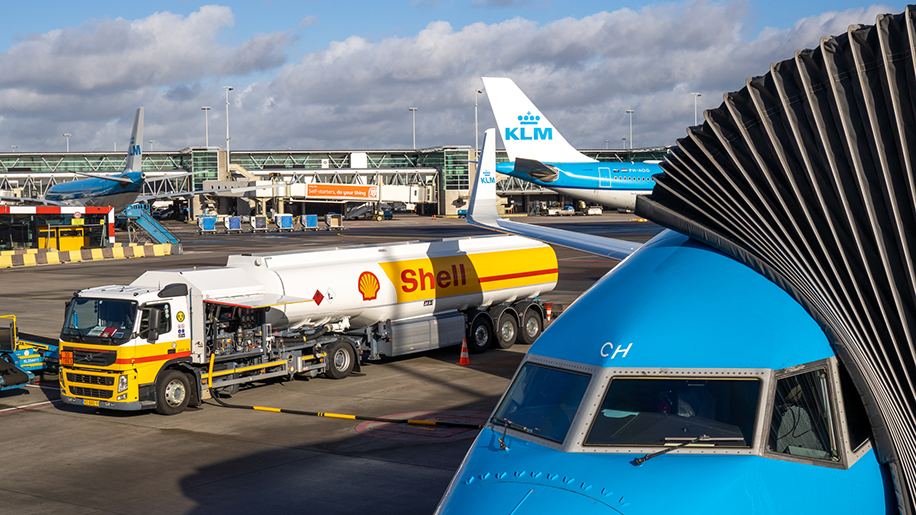
KLM has operated the first passenger flight with sustainable synthetic kerosene, it has announced. The flight was from Amsterdam Airport Schiphol to Madrid and took place last month, but was revealed today at an international conference on synthetic Sustainable Aviation Fuels (SAF) in The Hague.
The flight had a total of 500 litres of sustainable synthetic kerosene (or e-kerosene) produced by Shell in its research centre in Amsterdam. The fuel is produced from CO2, water and renewable electricity (solar and wind).
SAFs are seen by airlines as a short-to-medium term measure on their journey to net zero because they are “drop in” fuels, meaning they can blend with fossil jet fuel without a major change to aircraft design.
The ‘E” indicates fuel created using electricity, and of course for this to be considered sustainable, the electricity used needs to be from renewables.
For more on synthetic or e-kerosene, see this fact sheet from Transport and Environment.

The conference was initiated by Cora van Nieuwenhuizen, Dutch Minister for Infrastructure and Water Management and had European politicians, policymakers, representatives from the business community, the (aviation) industry and NGOs participating.
The purpose of the conference was to stimulate the development and application of sustainable aviation fuels (biofuels and synthetic kerosene) with the aim that European airlines will be able to fly entirely on sustainable fuel by 2050.
During the conference, new initiatives and startups were publicised including the start-up Synkero which announced that it is collaborating with Port of Amsterdam, Schiphol, KLM and SkyNRG on the realisation of a commercial synthetic sustainable kerosene factory in the Amsterdam port.
The project seeks to link with sustainable initiatives in the North Sea Canal area, such as the establishment of a 100 megawatt hydrogen plant where up to 15,000 tons of green hydrogen can be produced with sustainable electricity.

Another initiative is the construction of a demonstration factory for sustainable kerosene using captured carbon dioxide from the air as a raw material in Rotterdam.
The Zenid initiative, in which Uniper, Rotterdam The Hague Airport, Climeworks, SkyNRG and Rotterdam The Hague Innovation Airport are participating, uses a combination of technologies to focus on CO2-neutral aviation with sustainable synthetic kerosene.
Several European politicians, including Commissioner Timmermans, the German transport minister Scheuer and his French colleague Djebbari were at the conference and emphasized the importance of developing sustainably produced aviation fuels to reduce CO2 emissions and give aviation a good future.
In a joint statement, the Netherlands, France, Sweden, Germany, Finland, Luxembourg and Spain indicated that recovery from the current crisis due to the pandemic must go hand in hand with accelerating the sustainability of the aviation sector in order to achieve climate goals.
One way to do that is to create a mandate for the use of synthetic kerosene, which is, as Transport and Environment explains, “a binding policy instrument that makes it compulsory for all jet-fuel on the market to have a certain proportion of e-kerosene (“blending mandate”) or a certain reduction in the carbon footprint of the fuel (‘GHG intensity target’).”
Campaigners such as Transport and Environment say this is necessary, firstly because the “significant cost difference between e and fossil kerosene is a deterrent for a demand uptake [so] mandates will create demand for e-kerosene that will drive its price down. Second, by creating more certainty of demand, mandates would ensure investors confidence and thus drive investments that will result in a decrease in e-kerosene production costs. This has been the experience to date in other areas, such as the deployment of renewable electricity.”
For their part, The Member States view the development of sustainable synthetic kerosene in addition to sustainable biokerosene as “one of the most promising and effective ways to reduce aviation emissions in the coming decades”.












